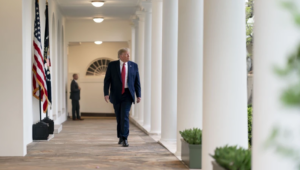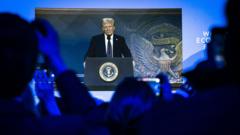Amid an election-year backdrop, President Biden is expected to announce his decision to block a significant $14 billion takeover bid by Japan's Nippon Steel for U.S. Steel, citing national security implications and potential impacts on American steel production.
Biden Set to Block $14 Billion U.S. Steel Takeover by Japan’s Nippon

Biden Set to Block $14 Billion U.S. Steel Takeover by Japan’s Nippon
The president's imminent announcement reflects national security concerns ahead of exiting office.
In a move that underscores important economic and international considerations, President Biden is poised to officially reject the $14 billion acquisition proposal by Nippon Steel for U.S. Steel, an iconic American metal producer. Sources suggest that the announcement might come this Friday, just a few weeks before Biden concludes his presidency.
The decision to halt the takeover comes after the Committee on Foreign Investment in the United States (CFIUS)—a federal committee that evaluates foreign investments—raised alarms about the implications of the deal for national security. Concerns were articulated regarding a potential reduction in American steel production and how Nippon Steel's international business operations could potentially conflict with its commitments to invest in U.S. Steel.
Though traditionally, foreign investment transactions in the United States have adhered to principles of openness, Biden's administration appears prepared to enact an unusual deployment of executive power. Should the president move forward with this block, it may influence how foreign investors view acquisitions involving domestic firms, particularly in sensitive sectors located within key political states like Pennsylvania.
This juncture not only raises questions about foreign investment dynamics but could also complicate the diplomatic rapport with Japan, which remains one of the United States' closest allies and notable sources of foreign capital.
In light of CFIUS's advisory, which did not formally recommend the enhancement of the transaction, Biden's anticipated announcement gains relevance in an election-year context, reflecting how economic policies and national security considerations intersect in a politically charged environment. As such, the blocking of this takeover bid could reverberate beyond mere economic metrics, shaping foreign relations and investment perceptions for years to come.
The decision to halt the takeover comes after the Committee on Foreign Investment in the United States (CFIUS)—a federal committee that evaluates foreign investments—raised alarms about the implications of the deal for national security. Concerns were articulated regarding a potential reduction in American steel production and how Nippon Steel's international business operations could potentially conflict with its commitments to invest in U.S. Steel.
Though traditionally, foreign investment transactions in the United States have adhered to principles of openness, Biden's administration appears prepared to enact an unusual deployment of executive power. Should the president move forward with this block, it may influence how foreign investors view acquisitions involving domestic firms, particularly in sensitive sectors located within key political states like Pennsylvania.
This juncture not only raises questions about foreign investment dynamics but could also complicate the diplomatic rapport with Japan, which remains one of the United States' closest allies and notable sources of foreign capital.
In light of CFIUS's advisory, which did not formally recommend the enhancement of the transaction, Biden's anticipated announcement gains relevance in an election-year context, reflecting how economic policies and national security considerations intersect in a politically charged environment. As such, the blocking of this takeover bid could reverberate beyond mere economic metrics, shaping foreign relations and investment perceptions for years to come.






















